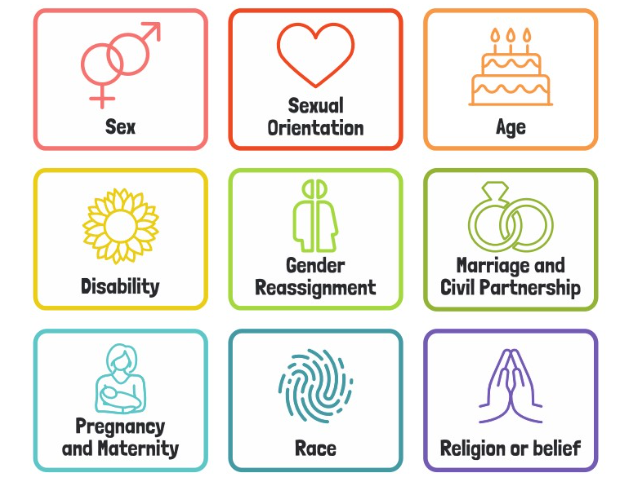Protected Characteristics
Promoting the Protected Characteristics at Pinders Primary School
We work to ensure that our children understand that:
- There are no outsiders at Pinders Primary school
- Everyone is different
- We celebrate our differences
- We are all equal in our difference
Pinders Primary is an inclusive school and we welcome people from all backgrounds.
We believe that the different cultures, talents and life experiences bring richness and vibrancy to school life and help create an environment that supports us all in learning from each other.
We aim to be a community where everyone is treated fairly and with tolerance and respect. We take seriously our duties to eliminate discrimination, promote equality of opportunity and foster good relations between people of all backgrounds, This duty is set out in the Equality Act of 2010. The Equality Act protects people against discrimination because of the protected characteristics that we all have.
Protected Characteristics
The Department for Education (DfE) has published non-statutory advice that sets out schools' obligations under the PSED.
Paragraph 5.1 explains that the PSED extends to the following protected characteristics:
- disability
- age
- gender reassignment
- marriage and civil partnership
- pregnancy and maternity
- race
- religion or belief
- sex
- sexual orientation
We have adopted these symbols, from Picture News, to use across the school whenever one of the characteristics is referenced.

Paragraph 5.1 of the document explains that the PSED has three main elements. In carrying out their functions, public bodies are required to have due regard to the need to:
- Eliminate discrimination and other conduct that is prohibited by the Equality Act 2010
- Advance equality of opportunity between people who share a protected characteristic and people who do not share it
- Foster good relations across all characteristics, and between people who share a protected characteristic and people who do not share it.
Due Regard
Paragraph 5.4 of the DfE's advice says that 'due regard' has been defined in case law and means giving "relevant and proportionate consideration to the duty".
For schools, this means:
- Decision makers must be aware of the duty to have due regard when making a decision or taking an action, and must assess whether it may have implications for people with particular protected characteristics
- Schools should consider equality implications before and at the time that they develop policy and take decisions, not as an afterthought, and they need to keep them under review on a continuing basis
- The PSED has to be integrated into the carrying out of the school’s functions, and the analysis necessary to comply with the duty has to be carried out seriously, rigorously and with an open mind.
What does our school do to eliminate discrimination ?
We have set a clear vision and values which expect all our staff to act in a non-discriminating manner and be mindful to avoid actions that will be deemed as such to the public and our wider community.
We have up-to-date and ratified policies which set out a clear message that discrimination is not tolerated. This includes the staff code of conduct, rights respecting behaviour, anti-bullying, safeguarding and child protection policies.
We understand that it is unlawful to fail to make reasonable adjustments to overcome barriers to using services caused by disability.
The governing body and school leaders involved in recruitment will avoid unlawful discrimination in all aspects of employment including recruitment, promotion, opportunities for training, pay and benefits, discipline and selection for redundancy.
Through a structured RSHE/PSHE curriculum offer, assemblies, workshops and visits, equalities are discussed with and taught to the children, exemplifying the British Values and school values that we believe in. Planning across all areas of the curriculum uses resources and case-studies which reflect diversity and challenge stereotypes.
Our Rights Respecting ethos recognises (Article 2 and 23 in particular) that all children have rights set out in the UNCRC, and individual children and young people shouldn’t be discriminated against when these rights are realised.
No form of discrimination is tolerated at Pinders Primary School and our pupils show respect for those who share the protected characteristics.
We do not teach about all the protected characteristics in every year group. The curriculum is planned and delivered so that our pupils develop age appropriate knowledge and understanding during their time at Pinders Primary School.
Outside of the PSHE/RSHE curriculum, the 9 Protected Characteristics are actively promoted at Pinders Primary School through:
- Our school ethos statement, school development plan (SDP), and school self-evaluation (SEF)
- Our school values
- Our school behaviour policy
- Assemblies
- British Values themes taught throughout the curriculum and in assemblies
- Discussion within other curriculum subjects
- Promoting articulation by building appropriate language and a coherent vocabulary
- Religious Education (RE) lessons
- RHSE lessons
- Sporting, Art and Cultural Events
- Pupil Voice
- Educational visits
- Guest speakers
- Developing links with local, national communities
- Extra-curricular activities, after-school clubs, charity work and work within the local community
Embedding Protected Characteristics into the whole ethos of Pinders Primary School promotes:
- Self-esteem, self-knowledge and self-confidence
- Respect for democracy and support for participation in the democratic process
- Acceptance of responsibility for their own behaviour
- Respect for their own and other cultures
- Understanding of how they can contribute positively to school and home life and to the lives of those living and working in the locality and further afield
- An understanding of Equality, Human Rights and Protected Characteristics
- An understanding of how citizens can influence decision-making through the democratic process
- An appreciation that living under the rule of law protects individual citizens and is essential for their wellbeing and safety
- An understanding that the freedom to choose and hold other faiths and beliefs is protected in law
- An acceptance that other people having different faiths or beliefs to oneself (or having none) should be accepted and tolerated, and should not be the cause of prejudicial or discriminatory behaviour
- An understanding of the importance of identifying and combating discrimination
